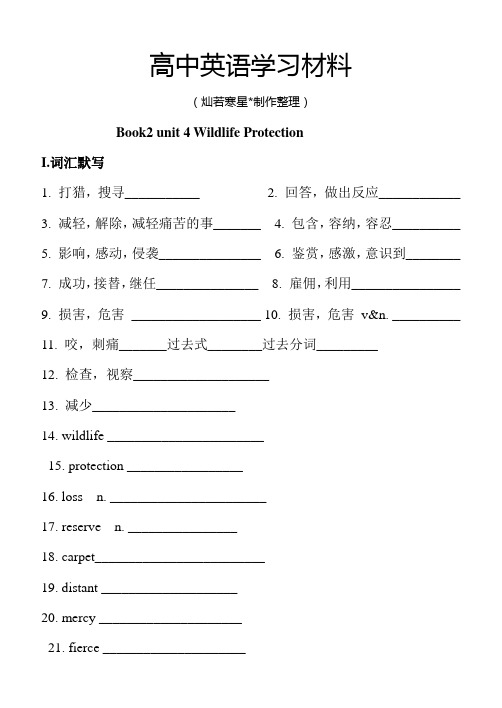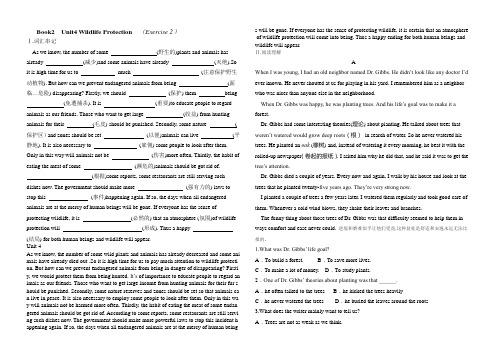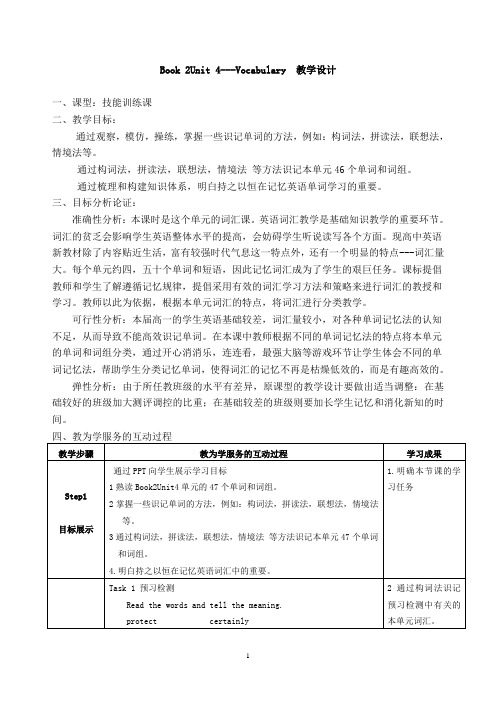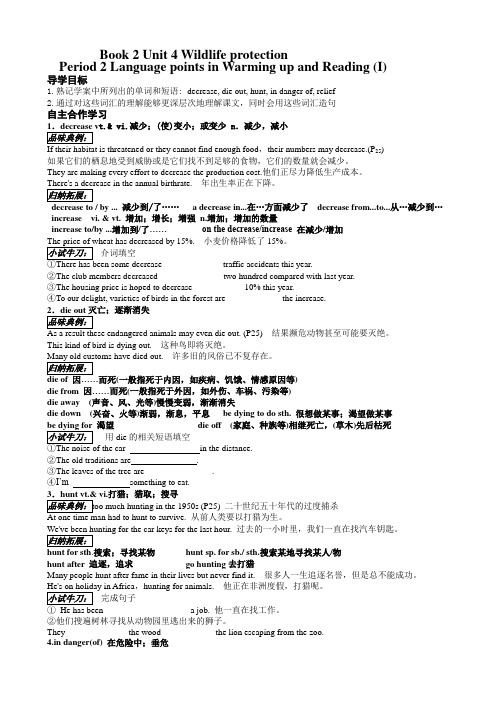高中英语《Book2 Unit4 Wildlife Protection Reading》优质课教案、教学设计
人教版book2u4 必修二 Unit 4 Wildlife protection语言点讲解及同步练习

Unit 4 Wildlife protection词语:1. wild作形容词,表示“野生的,野的,荒凉的,不守规矩的”。
be wild to do sth迫切地想做某事be wild with+抽象名词,表示“……得发狂,因……而发狂的状态”。
be wild out 极其热心或热爱run wild自由生长,不受控制作名词,表示“荒芜人烟的地方,偏僻的地区,荒野”。
2. protect作动词,表示“保护,警戒”,常与from连用。
protect与against连用,表示“防御……攻击”。
名词protection后面常与against,of连用。
3. loss表示“损失”是可数名词,常用复数。
表示“遗失,丢失,丧失”。
也可以表示战斗,比赛中“打输,失败”,是不可数名词。
at a loss表示“不知所措,不知(如何是好),亏本地”。
4. hunt表示“打猎,猎取”hunt for搜索,试图找到hunt sb/sth down对某人/某物穷追到底hunt sth up查寻作名词,前面加冠词。
5. peace表示“和平,合约,和平时期”。
be at peace w ith… 让……平静,与……和睦相处be in peace 安详的make peace 和解keep/break the peace 维持/破坏治安6. apply表示“申请,请求”。
apply for…(to…)向……申请表示“应用,使用”,其宾语后面接不定式,也可以用to+动名词。
apply to适用于,to是介词。
apply oneself to致力于,努力进行。
7. suggest表示“建议,提议”后接名词,动名词,不接不定式,也可以接从句,从句中的谓语动词由should+动词原形构成,should可以省略。
表示“使人想起,表明”后接名词或者是从句。
也可以表示“暗示,启发”,后接从句。
8. contain表示“包含,含有,容纳”,不用于进行时。
人教版高中英语必修二 Book2 unit 4 Wildlife Protection

高中英语学习材料(灿若寒星*制作整理)Book2 unit 4 Wildlife ProtectionI.词汇默写1. 打猎,搜寻___________2. 回答,做出反应____________3. 减轻,解除,减轻痛苦的事_______4. 包含,容纳,容忍__________5. 影响,感动,侵袭_______________6. 鉴赏,感激,意识到________7. 成功,接替,继任_______________8. 雇佣,利用________________9. 损害,危害___________________ 10. 损害,危害v&n. __________11. 咬,刺痛_______过去式________过去分词_________12. 检查,视察____________________13. 减少_____________________14. wildlife _______________________15. protection _________________16. loss n. _______________________17. reserve n. ________________18. carpet_________________________19. distant ____________________20. mercy _____________________21. fierce _____________________22. certain ________________________23. importance n. _____________24. rub ___________________________25. insect _____________________26. powerful ______________________27. secure _____________________28. income ________________________29.incident ___________________30. dust __________________________ II. 短语默写1. 灭亡,逐渐消失________________2. 和平地,安祥地____________3. 在危险中______________________4. 如释重负__________________5. 突然大笑起来__________________6. 保护….不受….._____________7. 形成,产生____________________8. 按照,根据…所说___________9. 以至于,结果__________________ III. 句子填空1. I am ________________(茫然不知所措)on how to deal with it.2. ____________________(陷入沉思), he didn’t hear what I said.3. Many traditional customs _______________ (逐渐消失)because they are out of date.4. The government has not ________________(对…答复) the complaints of the public.5. Hearing the good news, they all burst into laughter _______________(轻松地).6.We should take action to _______________________________ (保护河流不被污染)。
人教版高中英语Book 2 Unit 4 wildlife protection warming u

Unit4 Wildlife Protection
- Warming up and speaking
Listen to the music and enjoy the sounds of nature!
Acting out !
• Ask students to act out a dialogue about wildlife protection .
There has been some progress in saving endangered wildlife in China.
Problem : Too much hunting in the 1950s One habitat in China:
Baishanzu National Natural Protection Zone, Zhejiang Province Number before concern:
4)Why should we protect wildlife?
Wildlife is our friends.They can keep the balance of nature and make the whole
world colorful.To protect wildlife is to protect ourselves.
The number of the wild animals in the protection zones has increased.
The number of pandas : 1,600, The number of Milu deer:2,500, The number of South China Tigers :30-40.
人教版高中英语必修二 Book2 Unit4 Wildlife Protection (Exercise 2)

Book2 Unit4 Wildlife Protection (Exercise 2)Ⅰ.词汇串记As we know, the number of some (野生的)plants and animals has already (减少)and some animals have already (灭绝).So it is high time for us to much (注意保护野生动植物). But how can we prevent endangered animals from being (面临…危险) disappearing? Firstly, we should (保护) them being (免遭捕杀). It is (重要)to educate people to regard animals as our friends. Those who want to get large (收益) from hunting animals for their (毛皮) should be punished. Secondly, some nature ( 保护区)and zones should be set (以便)animals can live (平静地). It is also necessary to (雇佣) some people to look after them. Only in this way will animals not be (伤害)more often. Thirdly, the habit of eating the meat of some (濒危的)animals should be got rid of.(根据)some reports, some restaurants are still serving such dishes now. The government should make more (强有力的) laws to stop this (事件)happening again. If so, the days when all endangered animals are at the mercy of human beings will be gone. If everyone has the sense of protecting wildlife, it is (必然的) that an atmosphere (氛围)of wildlife protection will (形成). Thus a happy(结局) for both human beings and wildlife will appear.Unit 4As we know, the number of some wild plants and animals has already decreased and some ani mals have already died out .So it is high time for us to pay much attention to wildlife protecti on. But how can we prevent endangered animals from being in danger of disappearing? Firstl y, we would protect them from being hunted. It’s of importance to educate people to regard an imals as our friends. Those who want to get large income from hunting animals for their fur s hould be punished. Secondly, some nature reserves and zones should be set so that animals ca n live in peace. It is also necessary to employ some people to look after them. Only in this wa y will animals not be harmed more often. Thirdly, the habit of eating the meat of some endan gered animals should be got rid of. According to some reports, some restaurants are still servi ng such dishes now. The government should make more powerful laws to stop this incident h appening again. If so, the days when all endangered animals are at the mercy of human being s will be gone. If everyone has the sense of protecting wildlife, it is certain that an atmosphere of wildlife protection will come into being. Thus a happy ending for both human beings and wildlife will appear.Ⅱ.阅读理解AWhen I was young, I had an old neighbor named Dr. Gibbs. He didn’t look like any doctor I’d ever known. He never shouted at us for playing in his yard. I remembered him as a neighbor who was nicer than anyone else in the neighborhood.When Dr. Gibbs was happy, he was planting trees. And his life’s goal was to make it a forest.Dr. Gibbs had some interesting theories(理论) about planting. He talked about trees that weren’t watered would grow deep roots(根)in search of water. So he never watered his trees. He planted an oak (橡树) and, instead of watering it every morning, he beat it with the rolled-up newspaper(卷起的报纸). I asked him why he did that, and he said it was to get the tree’s attention.Dr. Gibbs died a couple of years. Every now and again, I walk by his house and look at the trees that he planted twenty-five years ago. They’re very strong now.I planted a couple of trees a few years later. I watered them regularly and took good care of them. Whenever a cold wind blows, they shake their leaves and branches.The funny thing about those trees of Dr. Gibbs was that difficulty seemed to help them in ways comfort and ease never could.逆境和磨难似乎让他们受益,这种益处是舒适和安逸永远无法比拟的。
人教版高一英语必修二《unit 4 Wildlife Protection》教学设计

Book 2Unit 4---Vocabulary教学设计一、课型:技能训练课二、教学目标:通过观察,模仿,操练,掌握一些识记单词的方法,例如:构词法,拼读法,联想法,情境法等。
通过构词法,拼读法,联想法,情境法等方法识记本单元46个单词和词组。
通过梳理和构建知识体系,明白持之以恒在记忆英语单词学习的重要。
三、目标分析论证:准确性分析:本课时是这个单元的词汇课。
英语词汇教学是基础知识教学的重要环节。
词汇的贫乏会影响学生英语整体水平的提高,会妨碍学生听说读写各个方面。
现高中英语新教材除了内容贴近生活,富有较强时代气息这一特点外,还有一个明显的特点---词汇量大。
每个单元约四,五十个单词和短语,因此记忆词汇成为了学生的艰巨任务。
课标提倡教师和学生了解遵循记忆规律,提倡采用有效的词汇学习方法和策略来进行词汇的教授和学习。
教师以此为依据,根据本单元词汇的特点,将词汇进行分类教学。
可行性分析:本届高一的学生英语基础较差,词汇量较小,对各种单词记忆法的认知不足,从而导致不能高效识记单词。
在本课中教师根据不同的单词记忆法的特点将本单元的单词和词组分类,通过开心消消乐,连连看,最强大脑等游戏环节让学生体会不同的单词记忆法,帮助学生分类记忆单词,使得词汇的记忆不再是枯燥低效的,而是有趣高效的。
弹性分析:由于所任教班级的水平有差异,原课型的教学设计要做出适当调整:在基础较好的班级加大测评调控的比重;在基础较差的班级则要加长学生记忆和消化新知的时间。
五、教学反思词汇的研究一直是语言界的热点。
英国语言学家威尔金斯(Wilkins)说过:“Without grammar very little can be conveyed, without vocabulary nothing can be conveyed .”我校的今年课堂大赛没有像往年一样选定课文阅读教学作为比赛的课题,而是别出心裁地确定了Book 2Unit 4的词汇作为赛课内容。
Book2 Unit4 Wildlife Protection grammar

Unit 4 Wildlife ProtectionGrammar课内探究现在进行时被动语态形式为:is / are / am + being+过去分词1、表示现阶段正在进行的动作现在进行时被动语态也可表示目前这一阶段主语正在承受谓语动词的动作。
例: Rainforests are being cut and burned at such a speed that they will disappear fromthe earth in the near future.2、表示计划或安排现在进行时被动语态还可表示按计划、安排主语将要承受谓语动词的动作(仅限于少数及物动词)。
例:A folk song is being sung next.下面将唱一首民歌。
3、没有进行时的被动语态一些表示状态、心理活动、拥有、存在等的动词(和主动语态一样)一般不用进行时被动语态,常用一般现在时被动语态表示此时此刻或目前主语承受谓语动词的动作。
如: 小王,过来,有你的电话。
【误】Xiao Wang, come here. You are being wanted on the phone.【正】 Xiao Wang, come here. You are wanted on the phone.4、其他形式表示被动结构"be +under/ in等介词+名词"结构可代替进行时被动语态。
The city is under attack ( is being attacked ) at the moment.目前这个城市正受到进攻。
The bridge is under repair / construction(=is being repaired/ constructed).桥梁正在修理中/建筑中。
课后拓展单选1. ---Have you moved into the new house? ---Not yet, the room ______.A. is being paintedB. are paintingC. are paintedD. are being painting2. Look! The ship ______.A. is unloadingB. is being unloadedC. had unloadedD. is been unloaded3. The children ______ many times not to swim in the river.A. toldB. have toldC. have been toldD. are being told4. The new plan ______ now.A. is discussedB. is discussingC. is being discussedD. is going to discuss5. The whole city looks like a big construction site. Many new factories ______.A. have been builtB. are being builtC. are going to be builtD. are building6. A science lab ______ in our school at present.A. is being builtB. has builtC. is buildingD. will be built7. Since your car ______. You may use mine.A. is being repairedB. has been repairedC. is repairingD. is being repairing8. A new cinema ______ here. They hope to finish it next month.A. will be builtB. is builtC. has been builtD. is being built9. Look! The roads ______ now.A. are wideningB. are widenedC. are being widenedD. is to be widened10. --- The window is dirty.--- I know. It _____ for weeks.A. hasn’t cleanedB. didn’t cleanC. wasn’t cleanedD. hasn’t been cleaned11. —I don’t suppose the police know who did it.—Well, surprisingly they do. A man has been arrested and _____ now.A. has being questionedB. is questioningC. has questionedD. is being questioned12. The serious expression on his face suggests that an important matter _____ by him.A. is consideredB. is being consideredC. has been consideredD. was considered13. I don’t know what time it is now. My watch _____.A. is repairingB. has been repairedC. is being repairedD. has repaired14. Can’t you see your problem _____? Have some patience, please.A. is being discussedB. is discussedC. was being discussedD. will be discussed15.I like these English songs and they ______ many times on the radio.A. taughtB. have taughtC. are taughtD. have been taught16.–What’s that noise?-Oh , I forgot to tell you. The new machine_____.A. was testedB. will be testedC. is being testedD. has been tested17.The hotel wasn’t particularly good, but I____ in many worse hotels.A. was stayingB. stayedC. would stayD. had stayed18.No decision______ about any future appointment until all the candidates have been interviewed.A. will be madeB. is madeC. is being madeD. had been made19.In recent years many football clubs ______ as business to profit.A. have runB. have been runC. had been runD. will run20. He ____as a national hero for winning the first gold medal for his country in the Olympics.A. regardedB. was regardedC. has regardedD. had been regarded21. Teenagers ____ their health because thy play computer games too much.A. have damagedB. are damagingC. damagedD. will damage22. The telephone ______ , but by the time I got indoors, it stopped.A. had rungB. was ringingC. ringsD. had rung23.-Do you have any problems if you ____ this job?-Well , I’m thinking about the salary…A. offerB. will offerC. are offeredD. will be offered24. –Did you go to the show last night?- Yeah. Every boy and girl in the area ____invited.A. wereB. have beenC. has beenD. was25.Though we don’t know what was discussed , yet we can feel the topic _____.A. had changedB. will changeC. was changedD. has been changed26. The flowers were so lovely that they _____ in no time.A. soldB. had been soldC. were soldD. would tell27. – Have you handed in your schoolwork yet?-Yes, I have. I guess it _____ now.A. has gradedB. is gradedC. is being gradedD. is grading28. At the end of the meeting, it was announced that an agreement _____.A. has been reachedB. had been reachedC. has reachedD. had reached29. Although the causes of cancer ____, we do not yet have any practical way to prevent it.A. are being uncoveredB. have been uncoveringC. are uncoveringD. have uncovered30. The policeman’s attention was suddenly caught by a small box which ____ placed under the Minister’s car.A. has beenB. was beingC. had beenD. would be31. According to the art dealer, the painting ____ to go for at least a million dollars.A. is expectedB. expectsC. expectedD. is expecting.32. The wet weather will continue tomorrow , when a cold front ___ to arrive.A. is expectedB. is expectingC. expectsD. will be expected33. – Did you watch the basketball match yesterday?- Yes, I did. You know, my brother ____ in the match.A. is playingB. was playingC. has playedD. had played。
英语高一必修二学案:Unit_4_Wildlife_protection_Period_2_Language_points_in_Warming_up_and_Reading

Book 2 Unit 4 Wildlife protectionPeriod 2 Language points in Warming up and Reading (I)导学目标1.熟记学案中所列出的单词和短语: decrease, die out, hunt, in danger of, relief2.通过对这些词汇的理解能够更深层次地理解课文,同时会用这些词汇造句自主合作学习v t.& vi.减少;(使)变小;或变少 n.减少,减小,their numbers may decrease.(P25)如果它们的栖息地受到威胁或是它们找不到足够的食物,它们的数量就会减少。
They are making every effort to decrease the production cost.他们正尽力降低生产成本。
年出生率正在下降。
减少到/了…… a decrease in...在…方面减少了decrease from...to...从…减少到…increase vi. & vt. 增加;增长;增强n.增加;增加的数量increase to/by ...增加到/了…… on the decrease/increase 在减少/增加小麦价格降低了15%。
介词填空②The club members decreased ______________ two hundred compared with last year.③The housing price is hoped to decrease ___________ 10% this year.④To our delight, varieties of birds in the forest are ____________ the increase.结果濒危动物甚至可能要灭绝。
This kind of bird is dying out. 这种鸟即将灭绝。
人教版高中英语必修二m2unit4_wildlife_protection

1
Why we need wildlife
protection
What we can get from
2
wildlife protection
A good example of wildlife
3&4 protection
summary
Animals
Where What did she find? How
made a lot of money for the farmers.
Daisy: So you _a_r_e__i_n_c_r__e_a_s_i_n_g(increase) in
number now. Glad to hear that. It shows the
_i_m_p__o_r_t_a_n_c__e_(important) of wildlife protection.
_y_o_u__r_s_e_l_f__.
Mcrounobntiaktien_yo_s:v_aI_e__frpi__no__d_wm_ae_ymr_bf_io_luld_ilp_ye_td_oe_(ippnrosoewtceetcrwt) mhdirecuh_fg_ra_on_md___ mosquitoes. You see, the drug _a_f__f_e_c_t_s( affect)
2.What animals did she come across?
a Tibetan antelope an elephant in Zimbabwe a monkey in a rainforest
1.Why has the antelope in Tibet become an endangered species?
- 1、下载文档前请自行甄别文档内容的完整性,平台不提供额外的编辑、内容补充、找答案等附加服务。
- 2、"仅部分预览"的文档,不可在线预览部分如存在完整性等问题,可反馈申请退款(可完整预览的文档不适用该条件!)。
- 3、如文档侵犯您的权益,请联系客服反馈,我们会尽快为您处理(人工客服工作时间:9:00-18:30)。
Book2 Unit 4 Wildlife Protection 教学设计
—综合视野下的高中英语阅读教学
“阅读的过程是读者与文本及其作者进行对话和沟通的过程。
有效的阅读体验能激发读者的阅读兴趣,提高读者的阅读能力,提升读者的阅读思维品质,并使读者在阅读过程中感受语言的魅力”(傅咏梅,2014)
基于上述考虑,结合该文的话题性强、脉络清晰、情感教育意义深远等特点,笔者从思维
和情感两个层面入手设计本课的教学。
一、思维层面——巧设任务,提高学生的高阶思维能力
根据认知心理学理论,阅读是一种积极的信息加工过程,是大脑运用语言和非语言的思维活动的过程(Goodman,1967,转引自李杰,2012)。
阅读教学就是训练和发展学生思维能力的过程。
通过阅读教学培养学生的思维能力,尤其是高阶思维能力,是一种切实有效的教学策略。
1.设计思索性问题
Sadker&Sadker(1991)认为,思索性问题是指那些不能仅仅依赖记忆(memory)或回忆(recall),而是需要更多的思考才能回答的问题。
通过梳理其先前获得的表层信息,继而进行分析与综合,才能作答。
且该类问题并无既定答案,仁者见仁,智者见智,学生可以充分的表达自己的观点,只要言之有理,言之有物,即为有效思考。
通过对思索性问题的回答,可以有效地促使学生积极开动脑筋,增强其分析和综合思维能力。
例如:在本课的第二环节,教师通过追问“ Are these “good” things really good enough?” “Is this solution the best way to solve the problem?” 引发学生的思考,使学生在深入理解文本信息的同时,将阅读所获取的信息与自己的经验进行比较,逐步形成自己的观点。
在学生小组讨论中,实现了观点与观点的碰撞,在碰撞中逐步完善自身观点。
继而进行辩论,在辩论过程中学生审辩他人观点,展示自己的观点,培养了审辩式思维能力。
在整个环节中学生一直处于审判式思考之中:从识别文章的主要观点,到获取支持观点的论据,再到最终思考政府的做法是否妥当,教师一直鼓励学生思考,与文本互动。
在理解这些信息的基础上,学生就会将文章内容与自己的经验进行比较,不断对自己提问:文章内容与我的想法是一致的还是矛盾的?作者给出了哪些理由?我是否被这些理由说服了?我的依据又是什么?我自己有得出了什么结论?我自己的观点是否令人信服?
在这一系列的质疑、碰撞、调整的互动中,学生进行了大量的、积极的思维活动,审辩式思维的
训练贯穿了整节阅读课,在潜移默化中学生的审辩式思维意识得到了强化和提升。
教师提出的思索性问题的答案并不能从阅读文本中直接获得,而是需要学生进行深入思考。
英语阅读教学是教师以文本为载体,引导学生获得信息、学习语言和发展思维的过程。
在获取信息、解读文本内容的过程中,学生往往会认为课文的内容肯定是对的。
教师若能引导学生质疑文本的内容,对学生而言是一个极富挑战性的任务。
通过质疑文本,大大提升学生的审辩式思维能力。
2.制作思维导图
思维导图又称心智图(mind map),是一种将知识结构和思维图像化的图形技术,它可以用色彩、图画、代码和多维度来加以修饰,以图文并茂的形式来增强记忆效果(东尼·博赞、
Rainforest
Home
Monkey
Milliped
e
by watching
by exploring
by appreciating
巴利·博赞,2009)。
学生通过加工把课文的文字转换成图表的过程也是阅读的思维过程。
通过制作思维导图可以使学生对阅读文本信息的分析更细致、更形象,也可以使学生在制作思维导图后更宏观、更综合地把握篇章的主题,思考作者传递的内容。
例如:文本第三段描述了热带雨林两种动物之间的相处活动。
借助这一特点,教师在引导学生梳理文中野生动物之间的关系时,设计了“圆饼式”思维导图(见下图),利用圆饼之间的关系,条理清晰地帮助学生梳理分析了两种野生动物的关系及其与热带雨林的关系。
通过制作好的思维导图进一步引导学生思考野生动植物的相处模式,追问“什么是保护野生动植物的最好方法”教师制作这一思维导图,引导学生思考,综合之前零散的信息,从而对文本有更深入、完整的理解,去追寻保护野生动植物的最好方法。
这一过程培养了学生深度思维能力。
师生制作这一思维导图的过程是学生主动思考和不断分析与综合的过程。
制作思维导图的活动有效地训练了学生的分析能力和综合能力。
本课板书的设计也设计为箭头思维导图的形式(见下图),清晰地揭示出Daisy 学习的方式与过程,使学生们对于Daisy 的学习方式有一个更立体、更直观的把握。
3.创设建构活动
建构是一个借用自建筑学的词语,原指建筑起一种构造。
建构主义是一种关于知识和学习的理论,强调学习者的主动性,认为学习是学习者基于原有的知识经验生成意义、建构理解的过程。
在建构过程中,学习者需要依据新经验对原有经验本身作出某种调整和改造(张大均,2014)。
建构是复杂的生成活动,通过建构,往往能生成创新的产品。
在阅读教学的课堂中,教师可以创造性的设计活动,引导学生基于阅读材料进行讨论,并生发出新的内容,这就能激发学生的创造力,训练创新思维。
例如:本课第三个环节是在学生辩论之后,建构新一轮讨论活动,进一步激发学生的
sad
relieved
hopeful
创造性思维,讨论“ 如何去保护野生动植物” ,并建构出三个不同的角度“government”、“organization”、“person”,让学生在半开放状态下创造性思考。
讨论后在课堂
上分析汇报自己的观点。
二、情感层面——串联环节,激发学生积极的情感体验
情感体验是阅读教学中非常重要的环节,它是文本、作者和学生之间情感的纽带,可以
使学生真正走进文本,理解和体会作者的思想情感,产生情感共鸣,并引发自身积极的情感,从而更深刻地理解和把握文本。
基于此,在设计本节课的教学时,教师一直在构思如何
以情动人、以情育人。
1.音频、视频激发学生情感
在课堂开始和第一场景藏羚羊结束处设计了两个具有强烈视觉和情感冲ft的小视频。
一
开始,播放一则公益广告,野生动植物随着钟表指针的走动而逐一消亡,这激起了学生的共鸣:我们应该去保护野生动植物!继而引发了学生的探索欲望:我们怎样保护野生动植物呢?在第一场景结束处,播放《沙图什:一条要命的披肩》。
这一视频讲述人类为了一己私欲,为了一
条轻盈保暖的沙图什披肩,使得藏羚羊这一在青藏高原生活,经过千万年演化、并流传下来的优势
物种频临灭绝。
在视频中,看到人类开着越野车,架着冲锋枪,朝即将临产的母藏羚羊横冲直撞,看到成群的藏羚羊尸陈荒野、遍地血红,这从视觉和听觉上给学生以强大的冲ft。
同时,激
发学生反思:猎杀者为何如此残忍?这无疑为后续课堂环节做了非常有效的感情铺垫。
在课堂结尾处运用音频We are the world 在温馨平和的歌声中,教师娓娓道来,对本节课
进行总结,同时以深情的语调启迪学生思考保护野生动植物的最好方法,即为尊重,不干扰。
歌声与教师的深情陈述融为一体,将课堂的气氛烘托到最高点,学生的思想得到启迪,情感得到升华。
2.感情线贯穿场景
在Daisy 的这次飞毯旅行中,有三个场景。
教师先通过问题引导学生分析出三种野生动植
物的生存现状、措施、结果等表层信息。
再由每个场景中描述Daisy 情感的句子,得出Daisy 在
旅行中的情感变化,在由板书中的思维导图(见下图)进行串联。
学生通过分析Daisy 的情
感变化,理解和体会作者的情感导向,产生情感共鸣,最终达成本节课情感教育的目标。
附表(1)学生课前预习表
附表(2)课堂学生学习效果评测工具。
